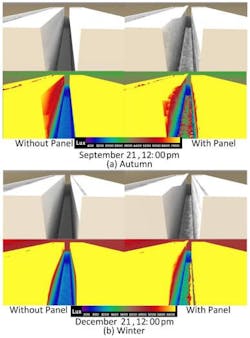Sinusoidal PMMA panels redirect sunlight to urban alleyways

An Optics Express paper describes a corrugated, translucent panel developed by Egyptian researchers that redirects sunlight onto narrow streets and alleyways; "We expect the device to provide illumination to perform everyday tasks, and improve the quality of light and health conditions in dark areas," said Amr Safwat, a professor of electronics and communications engineering at Ain Shams University in Cairo, Egypt.
RELATED ARTICLE: Prism sheet lets in more sunlight in winter, less in summer
The panel is mounted on rooftops and hung over the edge at an angle, where it spreads sunlight onto the street below. These dimly lit areas specifically include narrow streets in developing countries, but Safwat said the new panel could be used in any country as a greener, cheaper, and more pleasant alternative to fluorescent and other artificial light.
Made of polymethylmethacrylate (PMMA), the bottom of the panel is smooth while the top is covered in ridges that are based on an easy to manufacture sine-wave pattern. The researchers used computer simulations to find the size and shape of the grooves that distribute the most amount of sunlight in a wide range of sun positions all year round, whether it's high or low in the sky.
Using simulations of sunlight shining on an alleyway, the researchers found that their panels increased illumination by 200 and 400% in autumn and winter, respectively, when sunlight is most limited. They also tested a small prototype over a 0.4 m x 0.4 m shaft that is 1.2 m deep and found that it lit up the area as designed. The next step, Safwat said, will be to build a full-scale model 10 times bigger to validate their calculations and to test it in a real alleyway. The team then plans to market and commercialize the panel. He estimates that a one-square-meter panel and a frame will cost between $70 and $100.
"Research has shown that lack of natural lighting can cause severe physiological problems," such as serious mood changes, excessive sleeping, loss of energy and depression, Safwat said. This work was funded by the Science and Technology Development Fund of Egypt.
SOURCE: OSA; http://www.osa.org/en-us/about_osa/newsroom/news_releases/2014/let_the_sun_shine_in_redirecting_sunlight_to_urban/
About the Author

Gail Overton
Senior Editor (2004-2020)
Gail has more than 30 years of engineering, marketing, product management, and editorial experience in the photonics and optical communications industry. Before joining the staff at Laser Focus World in 2004, she held many product management and product marketing roles in the fiber-optics industry, most notably at Hughes (El Segundo, CA), GTE Labs (Waltham, MA), Corning (Corning, NY), Photon Kinetics (Beaverton, OR), and Newport Corporation (Irvine, CA). During her marketing career, Gail published articles in WDM Solutions and Sensors magazine and traveled internationally to conduct product and sales training. Gail received her BS degree in physics, with an emphasis in optics, from San Diego State University in San Diego, CA in May 1986.